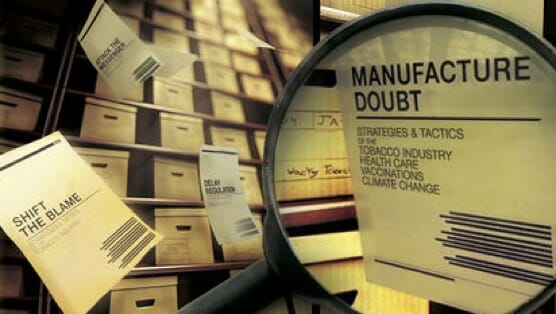Introducing Endless Mode: A New Games & Anime Site from Paste
When your objective is to get nothing done, you have a serious advantage. If honesty isn’t a priority, things get even easier. This is the most impactful—and the most depressing—takeaway of Robert Kenner’s documentary Merchants of Doubt. The slick production chronicles the people and strategies responsible for continually thwarting progress in the fight against climate change—along with other issues where science’s findings are clear, but political action is stifled.
With extensive research, based on the book of the same name by Naomi Oreskes and Erik M. Conway, Kenner has assembled a snappy exposé of political strategists who find savvy and sleazy ways to distort the truth when reality isn’t on their side. The public stays confused and leaders stay timid. It’d make for grand entertainment if it weren’t significantly endangering the world as we know it.
Many will be familiar with the main reasons the response to climate change has been muted. Much of the blame falls on a popular news culture that, rather than actually reporting to get to the truth of things, gives equal time to both sides and lets the one with better talking points rule the day. The idea that the jury is still out and that more research is needed has the kind of non-committal clarity that resonates with undecided people who would rather take the easier path.
The movie’s tone suggests it is unmasking decades of dark secrets. We meet people who have undermined scientific results in different fields, with different motivations. While climate change is the greatest issue in the movie, many topics are covered. A story about flame-retardant chemicals in furniture offers a surprisingly apt parallel to larger-profile issues.
Early on, Merchants of Doubt credits the tobacco industry for starting the trend of spinning science into political ambiguity. As more and more evidence revealed the health risks of smoking, the big tobacco companies kept quiet about what they knew, and contradicted outside results with fudged internal studies. Because the science was not on their side, they decided the best business model was doubt. The longer the public wasn’t convinced of tobacco’s deadliness and didn’t support legislation, the longer profits would stay high.
Not all of the propagators of doubt are solely after monetary gain. Some are tied to a libertarian agenda that makes them disinclined to believe anything that would support government regulations. Fred Singer and Fred Seitz are identified as two scientists whose contrarian opinions link back to their Cold War-era distrust of government regulations.
To provide a bit of hope, Kenner includes two stories of people taking on the uphill task of educating people who don’t want to be educated. Michael Shermer, the founder of Skeptic magazine, may have lost credibility with his community when he became a believer in man-made climate change, but he insists that part of being a skeptic is believing what the data shows. Meanwhile, former congressman Bob Inglis—a hard-line conservative from North Carolina—finds himself trying to spread the word to unlikely places like the right-wing talk radio circuit, where neither host nor listener wants to take him seriously. One gets the sense that these men may be on a futile mission, but it’s important and refreshing to see people motivated by something outside of political ideology.
Kenner does his best to make the material cinematic, and structures the film in a constantly intriguing way, slowly unraveling layers of the mystery. But some of his visual metaphors wear thin. The film begins with magician Jamy Ian Swiss explaining how magic tricks work, and the process of misdirection. Imagery such as flying playing cards then appears throughout the film, but its relationship with the subject matter stagnates. There’s no real effort to expand on the links—to think more about magic as we learn about the spin process.
While Merchants of Doubt may not reach transcendent levels, it does offer an eye-opening look at the darker side of the U.S. democratic process. And it’s remarkably thorough—especially considering its brisk 96-minute running time. In reality, it isn’t likely to reach enough people to initiate the change it aims for, but it can serve as a springboard for discussion about how we can avoid the political machine’s distortion and, maybe one day, rediscover the long-lost treasure that is the truth.
Director: Robert Kenner
Writer: Kim Roberts, Robert Kenner
Featuring: Frederick Singer, Naomi Oreskes, Jamy Ian Swiss, James Hansen, Bob Inglis, Michael Shermer
Release Date: March 6, 2015
